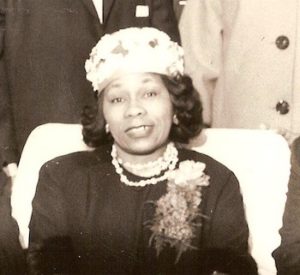
Louise Shropshire
*Louise Shropshire was born on this date in 1913. She was a Black composer for her religion and the church.
Born Louise Jarrett, the granddaughter of slaves and sharecroppers, was born in Coffee County, Alabama. In 1917, her family relocated to Cincinnati, Ohio. As a young girl, Jarrett demonstrated a gift for music and composed many hymns as a member of the Baptist Church. Sometime between 1932 and 1942, after marrying Robert Shropshire, she formed a gospel hymn, If My Jesus Wills.
In 1935, Rev. Thomas A. Dorsey discovered her at the National Convention of Gospel Choirs and Choruses (NCGCC) in Cincinnati. Dorsey, still considered the father of Gospel music, was impressed by Shropshire's talent as a composer and choir director and asked her to direct the mass choir segment of his convention. He also asked her to perform at the NCGCC with her family singing group, The Humble Three.
Rev. Dorsey and her would build a thirty-year friendship and co-wrote and copyrighted the gospel hymn, Behold the Man of Galilee. Some of Shropshire's other Gospel-copyrighted compositions are; I've Got The Big Seal Of Approval; I'm Tryin' My Best To Get Home To See Jesus; Whom Do Men Say That I Am?; I Know Jesus Pilots Me; Are you Worthy to Take Communion; Come on, Jesus Will Save You Right Now, and Mother's Beautiful Hands.
In 1954, Shropshire copyrighted a Christian hymn entitled If My Jesus Wills, a song she authored and published between 1932 and 1942. She recorded an additional copyright that same year for the song as part of a suite of eleven original gospel hymns entitled His Precious Blood. Throughout the 1940s and 1950s, she continued performing If My Jesus Wills across America at the National Convention of Gospel Choirs and Choruses as part of the repertoire of her choirs, The Humble Three, The Shropshire Singers, and The New Prospect Singers. It is believed that Folk singers adapted My Jesus Wills to become We Shall Overcome. Taking the advice of Dorsey, Shropshire distributed 1,000 pieces of the His Precious Blood sheet music collection to choir directors all over the country. Shropshire's lyrics resemble Methodist minister Rev. Charles Albert Tindley's 1901 composition, “I'll Overcome Someday." Although the two songs are very different musically, the popularity of Tindley's hymn suggests that Tindley's hymn inspired Shropshire's "If My Jesus Wills."
In the early 1950s, she met Rev. Dr. Martin Luther King Jr. and Fred Shuttlesworth. Finding much in common, Shropshire and King became good friends and established a strong and loyal spiritual alliance. Dr. King grew very comfortable with her family and stayed at the Shropshire home in Cincinnati. In addition, with the financial support of her husband’s successful bail bonds business, Shropshire held many fundraising events in her home and Cincinnati hotels, several of which were attended by Dr. King himself. Funds were raised at these events to help bail out Civil Rights activists incarcerated during the Birmingham Campaign and Montgomery Bus Boycott.
As a close friend of Rev. Fred Shuttlesworth and a devout member of the Baptist Church, she was instrumental in helping to establish the Greater New Light Baptist Church (GNLBC) in Cincinnati, Ohio. Following the death of her husband in 1967, Shropshire moved to California to be with her mother, Ollie Johnson Jarrett. Soon afterward, using her financial resources, she planted a sister church in Pomona, California, to the GNLBC in Cincinnati. Both churches remain active to this day. Later in life, she had taken over 50 foster children into her home and was known never to deny a brother in need. Having exhausted her financial resources while helping others, Louise Shropshire died penniless on November 26, 1993.
Reference:
We Shall Overcome Foundation